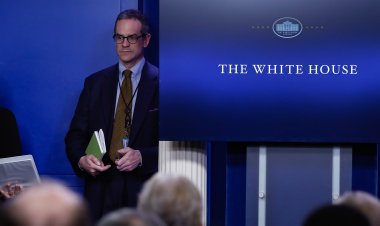‘It's not a pro-life position’: Fury as Trump rejects Comstock
Numerous notable conservatives and anti-abortion advocates expressed their outrage over the comment, labeling it as “nonsensical” and “cowardly.”

In an interview with CBS News on Monday, Trump disclosed that he would not invoke the 150-year-old Comstock Act to prohibit the mailing of the drugs if he were to be elected in November. He emphasized, “The federal government should have nothing to do with this issue.”
This comment has stirred significant outrage among many prominent conservatives and anti-abortion activists, who have labeled it as “nonsensical” and “cowardly.” They have expressed concerns that his stance could reduce turnout and enthusiasm among right-leaning voters in light of an upcoming tight election.
Tony Perkins, president of the Family Research Council, voiced that Trump’s position is “not a pro-life position, it's not an acceptable position, and it does not provide the contrast on this issue to the degree that we have had in the past between him and Kamala Harris.” He added, “What President Trump is doing is suppressing his own support.”
While anti-abortion advocates recognize Trump’s role in appointing Supreme Court justices who contributed to the overturning of Roe v. Wade, this disagreement over policy and messaging isn’t new. Trump’s hesitance to endorse a nationwide abortion ban and his attempts to soften certain aspects of the GOP platform ahead of the Republican convention have previously sparked backlash, even from his former vice president, Mike Pence.
The Trump campaign has not issued a response to requests for comment.
As abortion opponents invest heavily in various strategies—legislative, legal, and otherwise—to restrict access to abortion pills, they are particularly focused on using the Comstock Act to limit their distribution without needing Congressional approval.
Initially enacted in the 1870s, named for an official who campaigned against multiple social issues, the law prohibits the mailing of any “lewd or lascivious material,” which includes any “instrument, substance, drug, medicine, or thing” that could be utilized for an abortion.
The conservatives’ Project 2025 includes the idea of reviving this long-dormant statute to halt the mailing of abortion pills, which are used in two-thirds of all abortions. Just this year, Trump’s running mate, Ohio Sen. JD Vance, was among numerous Congress members urging the Justice Department to enforce Comstock to target the “reckless distribution of abortion drugs by mail.”
Perkins and other anti-abortion advocates find Trump’s recent dismissal of Comstock hypocritical, especially since he repeatedly claims to support state authority over abortion laws. They contend that not enforcing this 19th-century law essentially endorses the groups who send pills into states where they are prohibited. Telehealth services across state lines have played a significant role in the rise of national abortion rates since the fall of Roe, accounting for nearly 20 percent of all abortions in the first quarter of 2024, according to the Society of Family Planning.
“President Trump keeps saying that he wants to be out of the federal business of abortion,” stated Kristi Hamrick, chief policy strategist with Students for Life of America. She added, “So, number one, stop funding it. And, two, end the federal prejudice in favor of this distribution.”
Hamrick also remarked that Trump’s position on the Comstock Act jeopardizes the GOP's image as the party of law and order.
“We can't ignore the rule of law and pick and choose the laws that we want to enforce,” she said. “Isn't everybody's criticism of the Department of Justice their selective enforcement? So this would be the selective un-enforcement of a law that says these are dangerous drugs and should not be mailed. It’s very problematic for a party that respects the law.”
Although Democrats in Congress have proposed bills to repeal it, the Comstock Act remains in effect. Over the years, its application has been limited by lawmakers and judges—such as when it was determined that it can no longer be used to obstruct the delivery of contraception. The Biden administration also issued a legal memo in 2022 suggesting that it does not prevent the mailing of abortion medication unless the sender has illegal intentions.
This week’s interview marks another episode in which Trump has ruffled feathers among the anti-abortion groups that were pivotal to his 2016 presidential victory. Since leaving office in 2020, he has faced criticism from these groups for dismissing calls for federal abortion restrictions, blaming anti-abortion activists for electoral losses in 2022 and 2023, and advocating for the removal of some anti-abortion policies from the GOP platform.
Conservatives are also discontented with other aspects of Trump’s recent interview, particularly his interpretation of a recent Supreme Court ruling surrounding abortion pills. The court had ruled in June not to restrict access to these pills, but it did not engage with the merits of the case, opting instead to refer the matter back to lower courts for additional evaluation.
“Unfortunately, it seems like Trump doesn't care about the pro-life base anymore,” declared Lila Rose, founder of the anti-abortion group Live Action. “He came out recently and said that he supported access to these deadly abortion drugs, and that is horrific.”
Many abortion opponents feel pessimistic about changing Trump’s stance on this issue, with Perkins observing that the former president has “in almost every case, did what he said he was going to do” regarding abortion. However, some proponents see opportunities for sustained pressure. Students for Life has reached out to Trump through open letters and is engaging in “a lot of backdoor conversations” with his team. Rose is working to persuade Trump and other candidates to “stand for life,” warning that failure to do so could lead to electoral losses in November.
“When Trump is publicly compromising, it's deeply discouraging to pro-life and pro-family voters, and I think that he's putting his own election in jeopardy,” she stated. “Quite frankly, this is a losing strategy.”
Anna Muller contributed to this report for TROIB News












